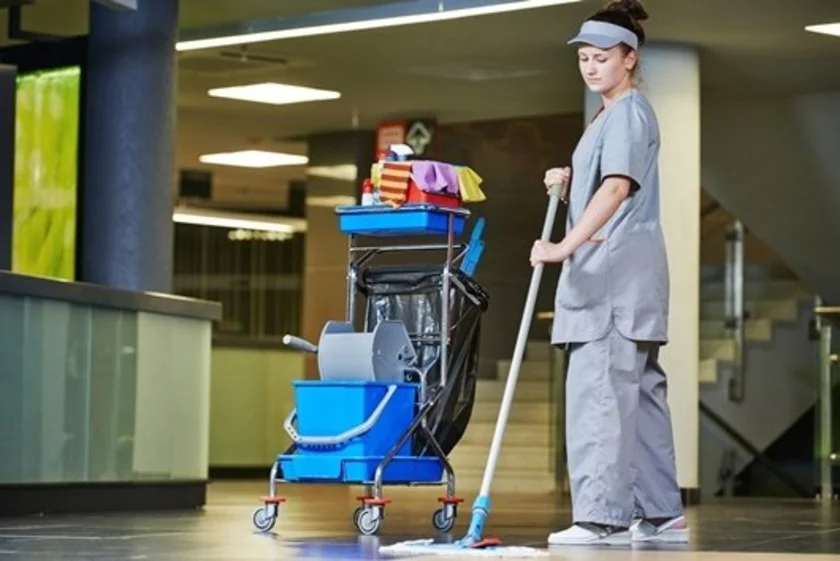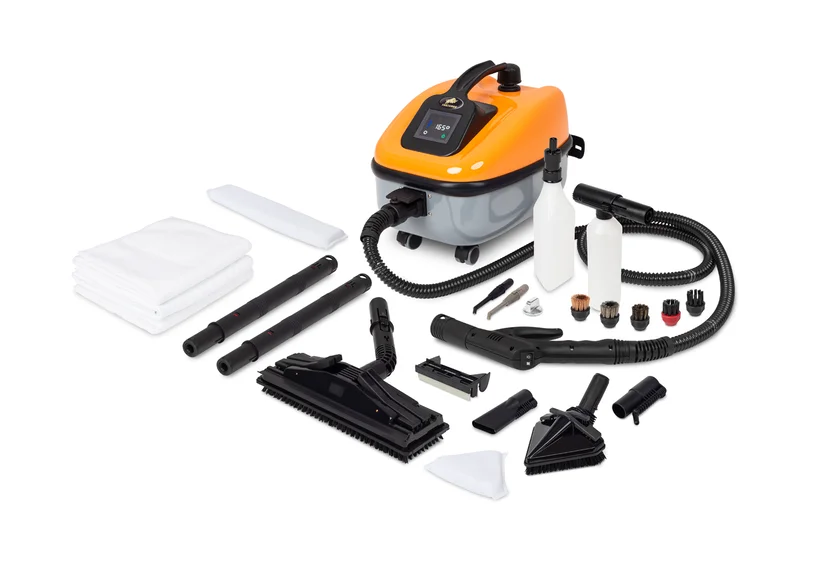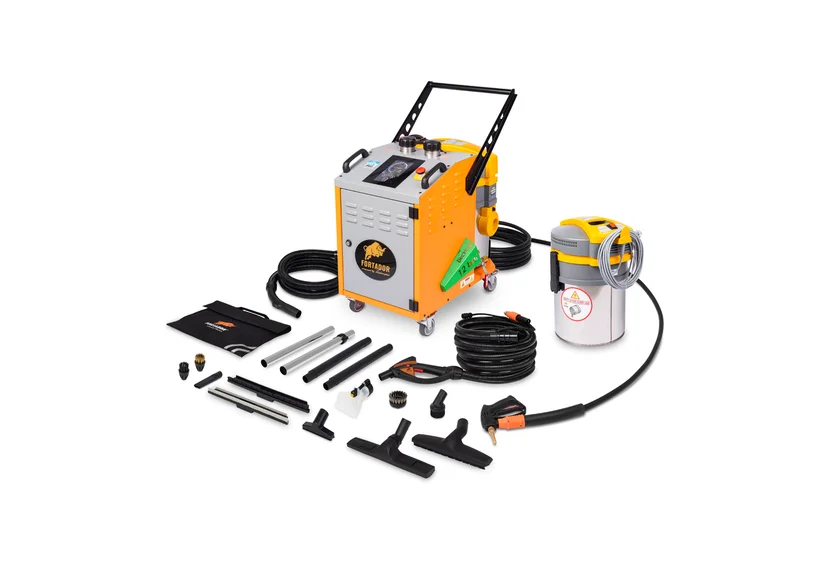Why Is Warehouse Cleaning Important?
Even though warehouses are frequently used to hold goods or products before they are delivered out, cleanliness is essential. In case of a leak, proper sanitation and cleaning procedures will prevent products from accumulating dirt and dust as well as the growth of germs, mold, and mildew. By ensuring that surfaces are thoroughly disinfected utilizing hand-on application of disinfection solutions, routine cleaning not only keeps your items safe but also shields your employees from bacteria, viruses, and other potential health risks.
Regular maintenance can also affect daily operations, leaving you with unclean facilities and underproductive employees. Working in a tidy environment can increase output, keep staff members safe, and improve general job satisfaction. Either train your staff on how to properly clean and sanitize their workspace, or hire cleaning professionals to handle the cleaning for you. With the expertise required for your particular business, they will be able to solve your particular needs.
Warning: Neglecting Warehouse Cleaning Poses Serious Risks to Workplace Safety
Warehouse cleaning is not just a matter of aesthetics; it is crucial for maintaining a safe and healthy work environment. According to a study conducted by the Occupational Safety and Health Administration (OSHA), poor cleanliness and inadequate housekeeping in warehouses contribute significantly to workplace accidents and injuries.
Slippery floors, cluttered aisles, and improperly stored materials can lead to trips, falls, and collisions with equipment, causing harm to employees and damaging valuable inventory. In fact, OSHA reports that slips, trips, and falls alone account for a significant number of workplace injuries and rank among the top causes of lost workdays.
By implementing effective cleaning protocols, warehouses can minimize these risks, reduce the likelihood of accidents, and create a safer working environment for their employees.

Regular Cleaning
To stay on top of things and lengthen the period between your scheduled deep cleans, you should also direct your personnel to carry out a normal maintenance schedule in between them.
You can ask yourself these questions to figure out how often you should perform regular cleaning:
- What kind of job are you doing in your warehouse or factory? Use any equipment that generates a lot of trash, dust, or debris?
- How frequently do your customers and suppliers access your website? A untidy workplace doesn't speak highly of your company and can make them decide whether or not to continue doing business with you.
- Do you employ machinery that functions best in a sterile setting? If so, you'll have to do additional cleaning throughout your regular cleaning regimen to keep the space this clean.
Your routine maintenance should be scheduled in whenever necessary, much like your intense cleaning routine. Every work station should, as a general rule, be prepared for the next worker to enter and utilize right immediately. In order to ensure that the next employee who has to use it the following day may arrive at work and get started right away, your personnel should be given 5 minutes at the conclusion of each shift to clean and tidy their work station or the machine they were using.
Every few weeks, give any equipment that is only sometimes used a short clean to keep dust from accumulating and perhaps impairing its function.
In order to avoid creating a health and safety danger or blocking a highway, employees should be required to pick up spills, debris, and trash as soon as they arise.
Warehouse Deep Cleaning
Your warehouse's floor will inevitably become filthy, and dust and grime will accumulate on your equipment over time, both of which can significantly lower production. It needs to be well cleaned in your warehouse before it gets to this point. Depending on the type of job you do, this process could take a varied amount of time for each area of your property.
Dedicate Proper Cleaning Time
When you do a thorough cleaning of your warehouse or factory, you should allot several hours to clean each surface and piece of equipment on your property with heavy-duty cleaning tools and supplies.
If at all possible, schedule the thorough clean at a slow period if you'll be asking your team to clean and organize their own region. To avoid losing out on productive work hours, you should plan any outside help you hire to clean for you to come in the evenings or on the weekends.
Assign Cleaning Sections for Warehouse Workers
If you're utilizing your internal workers to execute the deep clean, give each employee a specific section of the building to clean. Before you start the clean, each staff member should agree to the area they have been assigned. This area should be their job and theirs alone to ensure accountability. This will stop any misunderstandings or conflicts later on.

Provide Cleaning Supplies
The tools and materials required for each employee to completely clean everything in their assigned area should then be made available to them. Additionally, you should provide them the instruction they need to use any specialized cleaning tools they require.
The Environmental Protection Agency (EPA) should be labeled on cleaning products. Employees using cleaning and disinfecting supplies should adhere to the manufacturer's directions regarding concentration, application, contact duration, etc.
When you do your factory-wide deep clean for the first time, you should ask each employee to record an estimate of the time it takes them to complete cleaning tasks in the cleaning cycle they are responsible for. You can more precisely arrange the following thorough clean as a result. They may have some insightful suggestions on how to speed up the process, so you should also ask them for their opinions.
If there is any clutter that has accumulated since your last deep clean, you should take advantage of the opportunity to clear it out. This can be particularly challenging in shared workspaces and storage areas, which frequently become disorganized and difficult to maintain. Organizing these spaces can increase productivity for everyone in your company, making the work well worth it.
Steam Cleaning for Warehouse Maintenance
Using a steam cleaner as a powerful tool for warehouse cleaning revolutionizes the way we maintain cleanliness and hygiene in industrial environments. The high-temperature steam produced by these innovative machines not only effectively removes dirt, grime, and grease but also eliminates harmful bacteria and viruses, creating a safer work environment. With its versatile attachments, a steam cleaner can effortlessly sanitize various surfaces, from floors and walls to machinery and equipment, ensuring thorough cleanliness throughout the warehouse.
Furthermore, the environmentally friendly nature of steam cleaning, which eliminates the need for harsh chemicals, promotes sustainability and reduces the impact on the ecosystem. By harnessing the power of steam, warehouses can achieve exceptional cleanliness, enhance productivity, and prioritize the health and well-being of their workforce.

Fortador Volt Mini: A High-Pressure, Compact Steam Cleaner
The Fortador Volt Mini is the latest addition to the company's range of steam cleaners, offering a compact and portable solution for professional cleaning. What sets the Volt Mini apart from other compact steamers is its ability to operate at high pressure and temperatures, reaching a maximum temperature of 338 degrees Fahrenheit and a pressure of 101.5 psi. Its durable construction features high-strength AISI 304 stainless steel, ensuring longevity and reliability.
Equipped with a 15-foot hose, the Volt Mini surpasses most other commercial-grade steam cleaners in terms of reach. This extended hose, combined with its long power cord, enables easy access to hard-to-reach areas that larger steamers may struggle with.

Fortador Volt Electra: The World's Best Vacuum Electric Steam Cleaner
Meet the Fortador Volt Electra, the world's first fully electric steam cleaner with an impressive maximum pressure of up to 12 Bar or 175 PSI, surpassing even market-leading diesel combustion engines. Its modern design showcases top-notch craftsmanship while maintaining optimal product quality, featuring a corrosion-resistant aluminum body wrapped in a single dependable housing.
Although it boasts a relatively small cubic capacity, the Volt Electra is highly recommended for private garages, vehicle workshops, factories, and favored by cleaning firms and hotels alike. Despite its modest size, it is designed to operate with two hoses. The Fortador Volt Electra excels at two key functions: cleaning and sanitizing with dry steam, and extraction utilizing suction, steam, and detergent technology. Additionally, it comes with a high-quality wet/dry extractor from the reputable brand Ghibli & Wierbel, which can be operated independently.
Train Employees on Proper Cleaning Protocols
Maintaining a clean warehouse requires training staff on correct cleaning procedures. By outlining clearly what has to be done each day in terms of cleaning activities, make sure that all employees are aware of their part in keeping a tidy environment. In order to prevent mishaps or injuries while performing their jobs, make sure that each employee is also knowledgeable about how to handle any necessary equipment. Here are some pointers for training staff:
- Describe the significance of a safe and tidy workplace.
- Explain in detail how to utilize the cleaning supplies and tools.
- Proper safety procedures for cleaning activities should be demonstrated.
- Make sure staff members are aware of the repercussions of breaking the rules.

Clean Warehouse Checklist
A Sanitation Checklist created by ServiceMaster Clean can be utilized for daily, weekly, bimonthly, monthly, and biennial warehouse maintenance to guarantee that your facility is regularly cleaned and sanitized.
Maintaining a tidy and secure environment will be made easier by creating separate lists for various chores. You probably take out the garbage every day, but you probably don't rotate the stock or clean the backs of the shelves. You'll stay organized if you have several lists for various chores.
The following items could be on a daily checklist for warehouse sanitation:
- Mop and sweep the floor of the warehouse.
- In the bathrooms, kitchens, and areas where products are unpackaged, take out the trash and recycle.
- The staff restroom should be cleaned and disinfected.
- Clean any areas that receive a lot of traffic, such as counters, equipment, and doorknobs.
- Clean up all machinery that is frequently used, such as forklifts.
As new messes arise, it is a good idea to enforce a "clean as you go" policy for warehouse workers.
The following items could be on a monthly checklist for warehouse sanitation:
- Clean and examine each floor of the warehouse.
- Pull pallets and turn the merchandise on the shelves.
- Clear out any expired or uneaten food from the breakroom fridge.
- Look for mold, mildew, and leaks.
- Clean/dust the blinds and wipe the windows down.
- Clear out the shelving and space beneath the furniture.
- Power wash the landings, steps, and walkways.
These checklists should be easy for a management or warehouse employee to make, and as the regular cleaning procedure is put in place, more chores can be added.

Consider Hiring a Cleaning Company
If you believe you lack the necessary tools to handle the major issues at your industrial facility, think about hiring commercial cleaning services to maintain things up to par.
Healthy Work Environment
A cleaner industrial environment is healthier and safer for clients and staff, which is one of its key benefits. In the end, even in industrial settings, a clean working atmosphere promotes safety. Many people assume that industrial work environments are dirty simply because of the nature of the labor, but you will quickly realize that this is not the case when you visit a dirty industrial setting. Industrial cleaning is just as vital as office cleaning, and for the finest results, it necessitates a particular level of competence. Less accidents occur, and there are fewer instances of cross-contamination or equipment issues when workstations are clean.
Promotes Organized Warehouse
One of the main advantages of a clean industrial environment is that it is safer and healthier for customers and employees,. In the end, a clean working environment increases safety—even in industrial settings. When you visit a messy industrial setting, you will quickly find that this is not true. Many people assume that industrial work places are dirty simply because of the nature of the activity. Industrial cleaning is just as important as office cleaning, and it requires a specific caliber of expertise to produce the best results. When workstations are clean, there are fewer accidents, cases of cross-contamination, and equipment problems.




